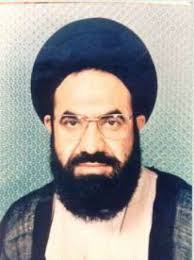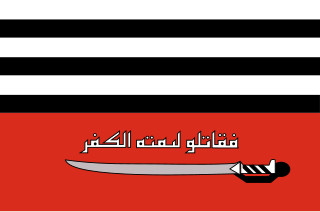
Azam Tariq was a Pakistani politician and cleric who was the leader of Sipah-e-Sahaba Pakistan (SSP), a Sunni Islamist organization, which was officially banned by the government of Pakistan in August 2001.

The situation of Human Rights in Pakistan is complex as a result of the country's diversity, large population, its status as a developing country and a sovereign Islamic democracy with a mixture of both Islamic and secular law.

The Sipah-e-Sahaba (SS), also known as the Millat-e-Islamiyya (MI), is a Sunni Islamist organisation in Pakistan. Founded by Pakistani cleric Haq Nawaz Jhangvi in 1989 after breaking away from Sunni Deobandi party Jamiat Ulema-e-Islam (F), it was based in Jhang, Punjab, but had offices in all of Pakistan's provinces and territories. It operated as a federal and provincial political party until it was banned and outlawed as a terrorist organization by Pakistani president Pervez Musharraf in 2002. Even though it has been banned by the Pakistani government on numerous occasions, the Sipah-e-Sahaba has continued to operate under a different name throughout the country; it has significant underground support in Punjab and Khyber Pakhtunkhwa. The organization was also banned by the United Kingdom, where there is a significant Pakistani diaspora population, in 2001.
Sectarian violence in Pakistan refers to violence directed against people and places in Pakistan motivated by antagonism toward the target's religious sect. As many as 4,000 Shia are estimated to have been killed in sectarian attacks in Pakistan between 1987 and 2007, and thousands more Shia have been killed by Salafi extremists from 2008 to 2014, according to Human Rights Watch (HRW). Sunni Sufis and Barelvis have also suffered from some sectarian violence, with attacks on religious shrines killing hundreds of worshippers, and some Deobandi leaders assassinated. Pakistan minority religious groups, including Hindus, Ahmadis, and Christians, have "faced unprecedented insecurity and persecution" in at least two recent years, according to Human Rights Watch. One significant aspect of the attacks in Pakistan is that militants often target their victims places of worship during prayers or religious services in order to maximize fatalities and to "emphasize the religious dimensions of their attack".
After the death of Prophet Muhammad in 632, a group of Muslims, who would come to be known as the Sunnis, believed that Muhammad's successor as caliph of the Islamic community should be Abu Bakr, whereas a second group of Muslims, who would come to be known as the Shias, believed that his successor should have been Ali ibn Abi Talib. This dispute spread across various parts of the Muslim world, which eventually led to the Battle of Jamal and Battle of Siffin. Sectarianism based on this historic dispute intensified greatly after the Battle of Karbala, in which Husayn ibn Ali and some of his close partisans, including members and children of Muhammad's household, were killed by the ruling Umayyad Caliph Yazid I, and the outcry for revenge divided the early Islamic community, albeit disproportionately, into two groups, the Sunni and the Shia. This is known today as the Islamic schism.

Syed Arif Hussain Al Hussaini was an Twelver Shīʿā Muslim scholar, Islamist ideologue, Islamic Jurist, and Islamic Revolutionist leader of Shia Muslims in Pakistan. He is also known as Khomanei-e-Pakistan for his activities which earned him the reputation of being one of the most prominent advocates for the Shia population of Pakistan. He viewed the ideas of secularism, nationalism, liberalism and socialism as evil, which he understood to be the influence of Western and Soviet imperialism.
Shia Islam was brought to the Indian subcontinent during the final years of the Rashidun Caliphate. The Indian subcontinent also served as a refuge for some Shias escaping persecution from Umayyads, Abbasids, Ayyubids, and Ottomans. The immigration continued throughout the second millennium until the formation of modern nation states. Shi'ism also won converts among the local population.
Islam is an Abrahamic monotheistic religion teaching that there is only one God (Allah) and that Muhammad is His last Messenger.

The Lashkar-e-Jhangvi, is a Deobandi supremacist, terrorist and militant organisation based in Afghanistan. The organisation operates in Pakistan and Afghanistan and is an offshoot of anti-Shia party Sipah-e-Sahaba Pakistan (SSP). The LeJ was founded by former SSP activists Riaz Basra, Malik Ishaq, Akram Lahori, and Ghulam Rasool Shah.
Hazara Town is a lower- to middle-income area on the western outskirts of Quetta, Pakistan, of which an almost all the residents are ethnic Hazaras, with a small population of Pashtuns and Baloch.

The persecution of Hazaras in Quetta, is a series of ethnic or religious motivated attacks on Hazaras in Quetta, Pakistan.

Anti-Shi'ism is hatred of, prejudice against, discrimination against, persecution of, and violence against Shia Muslims because of their religious beliefs, traditions, and cultural heritage. The term was first used by Shia Rights Watch in 2011, but it has been used in informal research and written in scholarly articles for decades.
The Pakistan Ulema Council (PUC) is a Muslim umbrella group and organization in Pakistan whose members include Islamic clerics and legal scholars from a range of Islamic traditions. Maulana Tahir Mehmood Ashrafi is its current chief. The organization was established initially to support a Christian girl who was charged with blasphemy.
On 16 February 2013, at least 91 people were killed and 190 injured after a bomb hidden in a water tank exploded at a market in Hazara Town on the outskirts of Quetta, the capital city of Balochistan, Pakistan. Most of the victims were members of the predominantly Shia Twelver ethnic Hazara community, and authorities expected the death toll to rise due to the large number of serious injuries. The Lashkar-e-Jhangvi group claimed responsibility for the blast, the second major attack against the Shia Hazaras in a month.

The 1988 Gilgit massacre refers to the state-sponsored mass killing of Shia civilians in the Gilgit District of Pakistan who revolted against military dictator Zia-ul-Haq's Sunni Islamist regime, responsible for vehement persecution of religious minorities as part of its Islamization program.

Majlis Wahdat-e-Muslimeen is a Pakistani Shi'a Islamic political organization. Its headquarters are in Islamabad. MWM Pakistan works to establish an Islamic democratic welfare state, particularly emphasising Shi'a-Sunni unity.

Anti-Sunnism is hatred of, prejudice against, discrimination against, persecution of, and violence against Sunni Muslims.
The Madhe Sahaba Agitation was a civil disobedience movement launched by Deobandi Muslims of Lucknow in the first half of the twentieth century to counter the commemoration of the tragedy of Karbala during Muharram. It resulted in a widespread Shia–Sunni conflict between the years 1906–1909 and turned violent in 1936–1939. The conflict spread to other parts of British India.
In Albuquerque, New Mexico, four Muslim men were killed between November 2021 and August 2022 in a series of ambush shootings.

Faith-Based Violence and Deobandi Militancy in Pakistan is a book released in 2016 by Palgrave Macmillan, which explores the connection between Deobandi ideology and acts of violence and terrorism based on faith in Pakistan. The book consists of 18 chapters, presenting an easily understandable analysis. It also delves into the presence of Deobandi groups in Western nations and other countries, discussing the involvement of their radical factions in incidents of violence and terrorism on an international scale.











